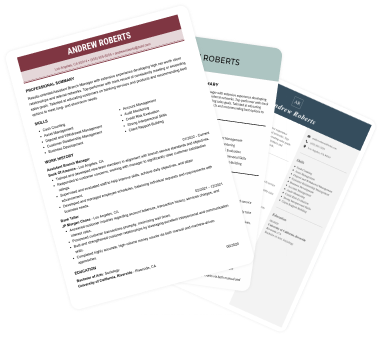Create a professional CV now!
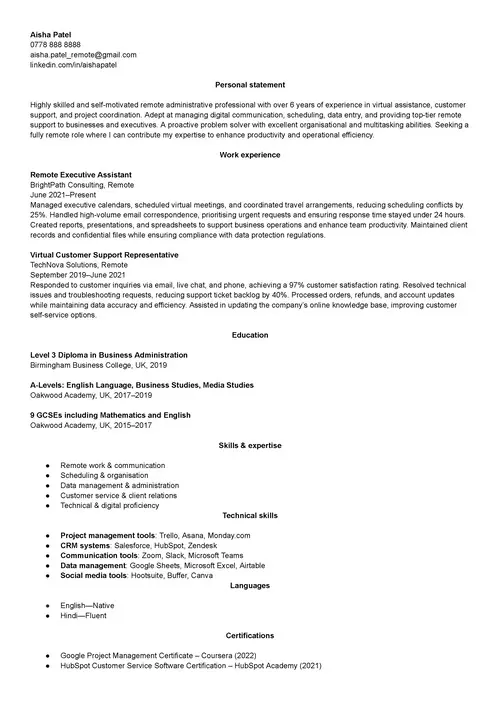 NO
NO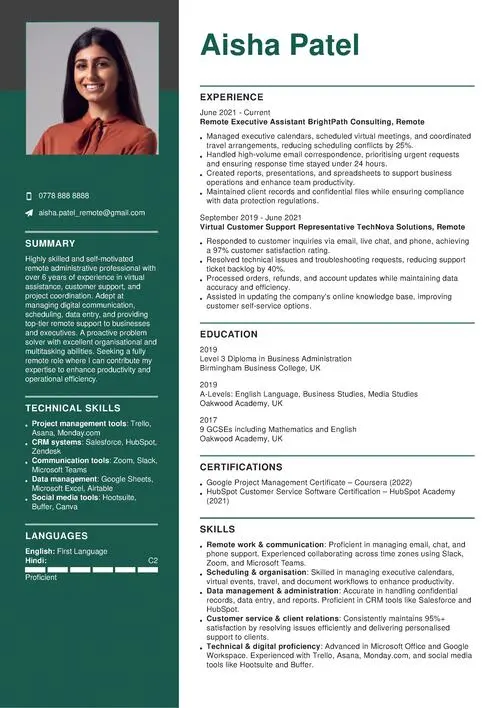 YES
YESLast updated on 29 December, 2025
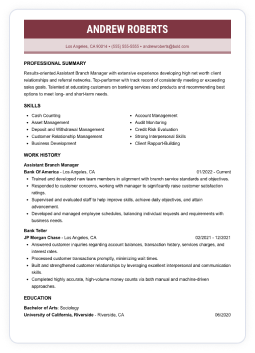
Our customers have been hired by*:
Working from home is an exciting opportunity, attracting many job seekers eager for remote employment. However, with so much competition, it can be challenging to stand out and convince employers that you are the right candidate.
That’s why you need a compelling work-from-hom e CV for remote jobs. With the right approach, you’ll increase your chances of landing the job and can start setting up your perfect home office.
Create an effective CV in minutes. Choose a professional CV template and fill in every section of your CV in a flash using ready-made content and expert tips.
Create a professional CV now!
 NO
NO YES
YESWe created the sample on the left using our builder. See other good CV examples like this one.
Need a different CV example? See these guides:
Aisha Patel
0778 888 8888
aisha.patel_remote@gmail.com
linkedin.com/in/aishapatel
Personal statement
Highly skilled and self-motivated remote administrative professional with over 6 years of experience in virtual assistance, customer support, and project coordination. Adept at managing digital communication, scheduling, data entry, and providing top-tier remote support to businesses and executives. A proactive problem solver with excellent organisational and multitasking abilities. Seeking a fully remote role where I can contribute my expertise to enhance productivity and operational efficiency.
Work experience
Remote Executive Assistant
BrightPath Consulting, Remote
June 2021–Present
Virtual Customer Support Representative
TechNova Solutions, Remote
September 2019–June 2021
Education
Level 3 Diploma in Business Administration
Birmingham Business College, UK, 2019
A-Levels: English Language, Business Studies, Media Studies
Oakwood Academy, UK, 2017–2019
9 GCSEs including Mathematics and English
Oakwood Academy, UK, 2015–2017
Skills & expertise
Technical skills
Languages
Certifications
Now that you understand what to include in a CV for a remote job, follow this step-by-step guide to create a standout work-from-home CV:
When applying for a remote job, your CV should highlight the specific skills and experiences that make you an ideal candidate for remote work. Employers look for candidates who can work independently, communicate effectively, and manage tasks efficiently in a remote work environment. Your CV for remote jobs should showcase the ability to stay organised, use digital tools, and adapt to remote collaboration. Below are the key sections and details to include in a strong remote job CV:
Employers frequently use applicant tracking systems (ATS) to evaluate candidates' suitability for a role. To increase your chances of passing this automated screening, your application should include relevant keywords from the job description. Key skills and competencies for remote jobs often include:
How can you identify the important keywords in the job description? Look for recurring words or phrases in the job title, responsibilities, and required skills sections. Employers often repeat key qualifications and competencies they value the most. You can also use online tools or a simple word frequency counter to extract commonly used keywords.
If you have prior remote work experience, highlight it explicitly in your remote job CV. Mention the companies you have worked for, and specify how you successfully managed tasks and communication in a modern workplace with remote job responsibilities. Any measurable achievements, such as improved efficiency, cost savings, or customer satisfaction ratings would be a definite advantage.
If you haven't worked remotely before, highlight any experience with virtual meetings—even familiarity with Zoom or Google Meet from a tutorial can be an asset. Emphasise any remote collaboration, self-managed tasks, or independent projects you’ve handled, as these demonstrate skills that are highly valuable to remote employers.
The CV summary (also known as the personal statement or professional profile) is a short introduction at the top of your work-from-home CV. It provides a concise overview of your skills, experience, and career goals, making it one of the first things employers read.
Similarly, a CV objective is a targeted statement that outlines what you aim to achieve in your next role. It is particularly useful for career changers, entry-level candidates, or those transitioning to remote work.
A compelling CV summary should be brief, engaging, and tailored to remote work opportunities. Ideally, it is between two and four sentences and provides a concise yet impactful overview of your professional background. Let the hiring manager know that you’re pursuing a remote role by saying it explicitly; this will help to avoid any confusion.
Your contact details should be clear, professional, and easy to find at the top of your CV for remote work. Include your full name, a reliable phone number, and a professional email address. If relevant, include a LinkedIn profile or a portfolio website showcasing your work (especially for creative, writing, or tech-based roles).
Your education section provides insight into your academic background and any specialised training relevant to the role. While degrees and diplomas demonstrate your formal qualifications, additional certifications can further validate your expertise, especially in remote work environments.
If you have pursued industry-specific courses, such as project management, digital marketing, or customer service training, be sure to include them. For technical or specialised roles, listing relevant coursework or areas of focus can strengthen your application and highlight your suitability for the job.
A strong CV summary will convince the recruiter you’re the perfect candidate. Save time and choose a ready-made personal statement written by career experts and adjust it to your needs in the LiveCareer CV builder.
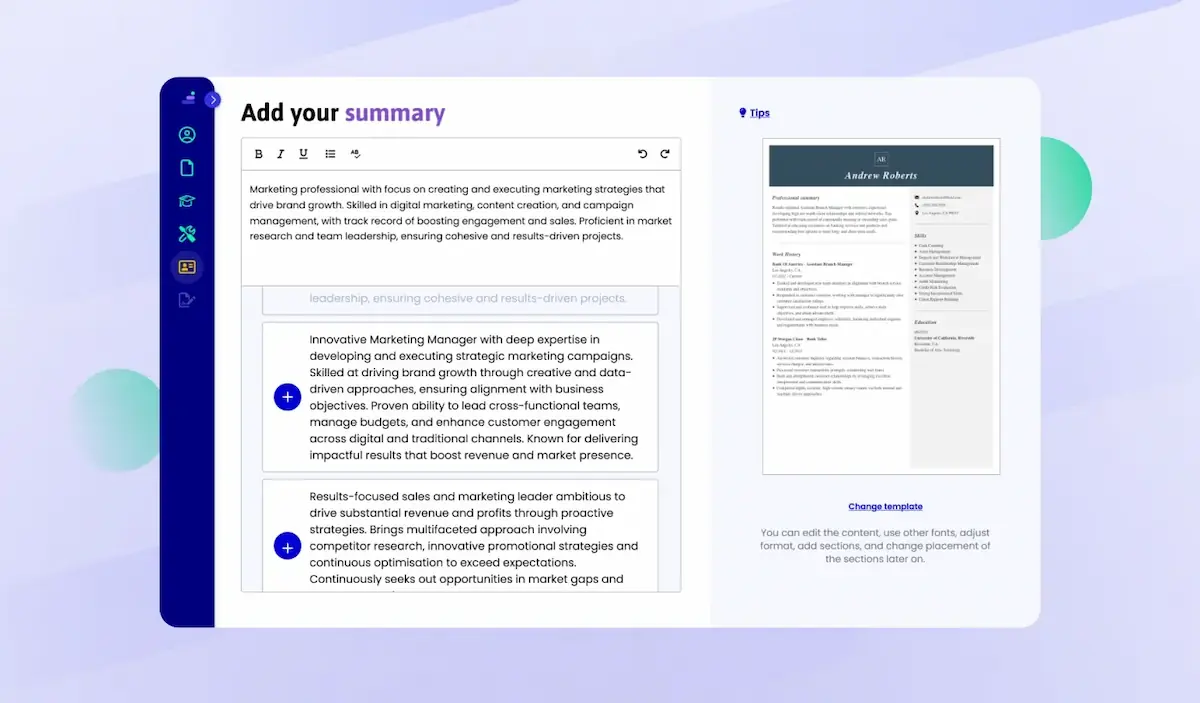
Creating a strong work-from-home CV requires a strategic approach to highlight your remote-friendly skills, experience, and adaptability. Follow these steps to craft the perfect CV for remote work.
Your contact information is the first thing employers see on your CV, so it’s essential to ensure it is clear, professional, and up-to-date. Include your full name, followed by a reliable phone number—if applying internationally, add the country code to enable seamless communication. Use a professional email address, preferably one that includes your name, rather than a casual or outdated username.
For remote roles, having an optimised LinkedIn profile can strengthen your application, so include the link if applicable. If you work in a field such as writing, design, or software development, adding a portfolio or personal website can showcase your expertise and make your application more compelling.
Avoid listing your full home address, as it’s unnecessary for remote applications. Instead, simply include your city and country, which is sufficient for employers to understand your location and time zone compatibility. Keeping this section professional and well-structured ensures that you make a strong first impression from the outset.
As I mentioned earlier, a strong CV summary (which is also often called a personal statement) provides a brief, engaging overview of your experience, skills, and career goals. If you are an experienced remote worker, focus on your professional achievements and key skills that relate to working from home. If you are new to remote work or changing careers, a CV objective is a better option—it highlights your transferable skills and what you aim to achieve in the role.
Here’s how to write a strong CV summary in a few steps:
Whether you have a formal degree, specialised training, or industry certifications, the education section helps employers see how your background aligns with the role. Include:
If you have completed industry-specific courses or certifications (such as project management, digital marketing, or customer service training), be sure to include them. Certifications are particularly useful for technical or specialised remote roles, demonstrating that you have the necessary skills for the job.
For technical roles such as software development, digital marketing, or data analysis, consider listing relevant coursework or specialisations to strengthen your application.
Your work experience section is where you prove that you have the skills and adaptability needed for a remote role. It should showcase how you have successfully worked remotely or adapted to virtual collaboration. When listing previous roles, include:
If you have previous remote work experience, make it clear that you have thrived in a remote environment by showcasing:
Even if you haven’t worked remotely before, showcase experience with virtual meetings, remote collaboration, self-managed tasks, or independent projects—these demonstrate valuable skills for remote employers.
Remote work requires a unique combination of self-motivation, time management, and digital proficiency. You need to be comfortable using online collaboration tools, handling virtual communication, and managing tasks with minimal supervision.
Your skills section should focus on both technical and soft skills essential for remote work. Instead of listing generic skills, integrate those that align with the job description and highlight remote proficiency.
See key remote-friendly skills to include:
Additional CV sections can set you apart from other candidates by highlighting the extra value you bring to a remote role. While the core sections (like work experience and skills) are essential, adding the right extras can make your application more distinctive and well-rounded.
Here are a few optional sections worth including:
Including extra sections tailored to your strengths and the needs of the role shows that you’ve gone the extra mile—and that’s exactly what remote employers are looking for.
Even in remote hiring processes—often streamlined and impersonal—a well-crafted cover letter can set the tone for a more human connection. It’s your chance to go beyond your CV and speak directly to the company: to show that you’ve done your homework, understand the remote context, and can contribute meaningfully from day one.
Here’s what to keep in mind when writing a cover letter for a remote job:
A strong, tailored cover letter can be the deciding factor in landing an interview—especially when employers are sifting through dozens of remote applications.
Before submitting your work-from-home CV, ensure it is error-free, well-structured, and visually polished. Hiring managers often skim through applications, so a clear CV layout and concise writing are crucial.
You don’t have to be a CV writing expert. In the LiveCareer CV builder you’ll find ready-made content for every industry and position, which you can then add with a single click.

Thank you for reading this guide on how to write a compelling remote job CV. Do you have any questions about structuring your CV for remote jobs? Have you successfully landed a remote role using any of these tips? Let me know in the comments.
Our editorial team has reviewed this article for compliance with LiveCareer’s editorial guidelines. It’s to ensure that our expert advice and recommendations are consistent across all our career guides and align with current CV and cover letter writing standards and trends. We’re trusted by over 10 million job seekers, supporting them on their way to finding their dream job. Each article is preceded by research and scrutiny to ensure our content responds to current market trends and demand.
Category: CV Examples
Crafting a job-winning CV is all about showcasing your unique skills and experiences. Start with a strong personal statement that highlights your career goals and achievements.
Try Our CV Builder Now